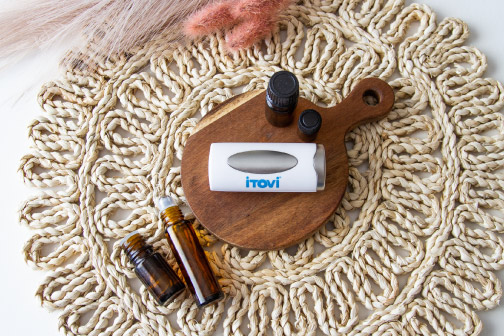
It’s a typical day.
And your various body parts are all queuing to make their voices heard—your stomach is trying to submit a progress report on digesting last night’s dinner, your right foot would like to lodge a complaint about the pebble in your shoe, and your brain is simultaneously sending instructions to your fingers typing out a text message and asking it’s front part, the prefrontal cortex, what the text message should say next.
And that’s just four of the things your body is trying to say!
Your body is a complex, busy place with lots of active parts, including organs, tissues, changing needs, processes, and more! And the only way it manages to successfully balance all these pieces is this—it knows that communication is key.
Hence, your nervous system.
Made up of seven trillion nerve cells, your nervous system makes up a highway of communication that stretches from the tips of your toes to the top of your head. It makes it possible for your senses to work, for your brain to think, your limbs to move, and for all your various organs to do their jobs without your conscious input.
When this communication highway, your nervous system, is working well, your body parts can coordinate together and get the business of living done, including learning, maintaining basic health, and enjoying all the emotions of life!
But when your nervous system isn’t working well, your body could have a “Tower of Babel” situation—in which your various parts can’t communicate with each other and serious motor, sensory, emotional, mental, and organ functions can be disrupted or even damaged.
| What is the Difference Between the Brain & the Nervous System? |
| Your brain is part of your nervous system.
To be specific, the nerves in your brain (plus some of the nerves in your spine) make up your central nervous system. The central nervous system integrates information from and gives direction to the peripheral nervous system, which has many branches including the Sensory Division (nerves that enable your senses), the Somatic Nervous System (nerves that allow you to move consciously), and the Autonomic Nervous System (nerves that run all of your unconscious bodily functions through one of two branches, either the sympathetic nervous system or the parasympathetic nervous system). |
Can Essential Oils Help Me Keep My Nervous System Healthy?
Yes.
Essential oils can help you:
- Establish, maintain, and optimize basic health habits to keep your nervous system healthy
- Balance the “sympathetic” and “parasympathetic” branches of your nervous system
- Possibly reduce the symptoms of neurodegenerative diseases like Alzheimer’s, dementia, and neuropathy.
Want to learn how? Keep reading.
Essential Oils & Basic Nervous System Support
All the essential oils in the world can’t replace the basic health habits that keep your nervous system (and your entire body) running. But—essential oils can be powerful tools to help you optimize those health habits for the best results!
The Power of Zs for Your Nervous System
Your precious 7-8 hours of sleep make an enormous difference for the health of your nervous system.
Firstly, sleep helps to balance your nervous system. Your nervous system has a lot of branches (central vs peripheral, somatic vs autonomic, sympathetic vs parasympathetic, etc). Your typical day can throw these branches out of balance with each other. But sleep allows your body to balance them back out again so you can have a full-functioning nervous system (and by extension, fully-functioning brain, muscles, senses, and organs) tomorrow!
Secondly, sleep consolidates memory. Memory-formation and preservation is one of the jobs of your nervous system. And sleep allows your nervous system to do its job, reinforcing the neural circuits and in some cases even generating new neurons to preserve your daily memories (things you learned, tasks you completed, places you went, etc).
So, what can you do?
- Try to get to bed at the same time every night. This allows your body’s natural sleep cycle (circadian rhythm) to settle, reducing stress on your body and making it easier to fall asleep. (Bonus tip: Between 10-11 p.m. is the heart-healthiest time to go to bed.)
- Don’t skimp on your bedtime routine. It’s easy to dread our bedtime routine as a boring chore—but a “boring” routine is just what your brain needs to help it wind down and prepare for sleep. Stop thinking and try to savor the sensory cues of your bedtime routine, including your relaxing essential oils!
- Balance things out with a morning routine. Your circadian rhythms only settle just right if you get up at a regular time too. Create a morning routine that makes it easier to adjust into full wakefulness. Energizing oils recommended!
- Perfect your sleeping space. Because sleep is so important, it’s worth it to invest in your sleeping space. Consider how a better mattress and pillow, blackout curtains, a sleeping mask, fan, white noise machine, or a “do not disturb” sign could help you maintain better sleep habits.
Fueling Your Nervous System
Every system runs on a particular type of fuel—on which it runs most smoothly and efficiently. And, of course, any system slows down or even starts breaking when it gets either not enough or the wrong kind of fuel.
And your nervous system is no different.
It needs the right balance of vitamins and minerals AND plenty of healthy fats to keep your nerve cells, especially the ones in your brain, working in peak condition. And nutrient deficiencies, smoking, and excess alcohol can damage your nerve cells and their functioning!
What can you do?
- Eat healthy fats. Omega 3s, found in fish oil and certain grains, and poly/monosaturated fats, found in nuts, seeds, avocados, and olive oil, are great sources of fuel for your nervous system. You can use your essential oils to resist unhealthy cravings and make delicious olive oil-based marinades and sauces!
- Supply your nervous system with the right micronutrients. Consider using a food nutrition app to help you get the right nutrients onto your plate! Some of the micronutrients vital for the nervous system are:
-
-
- Potassium – Edamame, avocados, beans, potatoes, bananas, oranges,
- Calcium – Soybeans, leafy greens, dairy, figs,
- B Vitamins – Healthy proteins, dairy, leafy greens, legumes
- Sodium Balance – It’s easy to get too much sodium in your diet, but eating fewer processed foods will help!
- Also recommended: dark chocolate, salmon, sardines, chia seeds, cauliflower, sprouts, and canola oil. These foods can help your nerves fire faster and more smoothly.
-
- Antioxidant up! Antioxidants help keep your nerves safe from damage. They are found in most fruits and vegetables, but especially in raw berries, artichokes, pecans, and most essential oils!
- Avoid smoking and excess alcohol. These things damage your nervous system! Try using essential oils for stress relief rather than these substances.
- Consider intermittent fasting. Intermittent fasting, apart from assisting in weight management, is believed to boost your nervous system by increasing neuroplasticity and preventing metabolic syndrome. Learn more about intermittent fasting here!
Working your Nervous System (Use it or Lose it!)
Nerves that don’t fire/get used on a regular basis eventually degrade.
And, depending on where the degraded nerves are, we can experience a wide range of unpleasant symptoms—irritability, decreased mental acuity, loss of muscle control, pain, and more.
To avoid these symptoms, nervous system imbalances, and neurodegenerative diseases later in life, we should regularly use ALL the parts of our nervous system.
What can I do?
Central Nervous System—Exercise your brain! Memory games, logic puzzles, chess, sudoku, and more! Use essential oils as sensory cues to help you focus! (Rosemary especially). Also, regular, healthy amounts of exercise (and especially exercises that strengthen the backbone) can also boost your CNS activity.
Sensory Division—We tend to lean on our eyes more than anything, but it’s important to exercise our other senses too! It’s easy! Just close your eyes every once in a while to savor the music that’s playing, the tastes in your food, the smells in the air (especially the ones coming from your diffuser!), and the feel of things in your hands or on your skin. You can even try meditations that help you use your proprioceptive (muscle & movement) and interoceptive (internal bodily sensations) senses.
Somatic Nervous System—Move your body often! And move it in new ways. When we sit all the time or overdo activities involving repetitive motion (i.e. typing all day), it can wear down our nerves. Dance, yoga, circuit training, and other movement-based activities can help a lot! Exercises that strengthen the backbone may be especially helpful.
Autonomic Nervous System—The autonomic nervous system is split between the parasympathetic division and the sympathetic division. Read the next section for important details on balancing these two branches.
Sympathetic & Parasympathetic Balance: Why It’s Important (And Where Essential Oils Come In)
You’ve likely heard, many times, that stress is bad for your health. But what does the nervous system have to say about this?
Well, your nervous system manages your stress levels by toggling between the two branches of your autonomic nervous system: your sympathetic nervous system and your parasympathetic nervous system.
Your sympathetic nervous system (SNS) is there to help you take on stress and perform at a high level.
When you need to work out, think hard, gear up for a difficult conversation, or deal with other stressful things, your sympathetic nervous system fires up your brain and muscles to help you get things done!
And this is often a good thing! A healthy amount of stress/sympathetic nervous system activity helps keep our brains young and prevent the onset of age-related, neurodegenerative disease.
But it’s still true that whenever you are in a sympathetic state, with the SNS in charge, you are undergoing some level of stress. You are using more energy, your body is likely more tense and externally observant, you are closer to activating your freeze-flight-or-fight responses, and you are likely firing off more beta brain waves than other brain-wave types
And, while some degree of stress is healthy, too much stress can throw your nervous system out of balance. For optimal nervous system health, your sympathetic nervous system activity needs to be balanced out by parasympathetic nervous system activity.
Your parasympathetic nervous system (PNS) helps you relax, use less energy, slow down your brain waves, and allow your body to rest, digest, heal, and rebalance itself.
The trouble is, too many of us don’t know how to relax. We don’t know how to turn on the parasympathetic nervous system!
Often, there is just so much that we need to/want to get done (and we are so averse to boredom and addicted to stimulation in modern society) that we spend too much time with the sympathetic nervous system turned on and not enough time with our parasympathetic nervous systems.
Eventually, this imbalance takes a toll, not just on our stress levels and nervous system health, but also on our sleep, energy levels, brain function, mood, digestive health, and more!
We combat this by making sure we have parasympathetic breaks in our day. We recommend:
- A few parasympathetic resets (5-10 min.) in your day to help you lower your stress.
- One to three parasympathetic sessions (20-90 min) in your day to reset your brain and regain energy.
- Always making enough time for your biggest parasympathetic session—your 7-8 hours of sleep!
What can I do? What can my essential oils do?
- Pay attention to your body. Paying attention to your body’s energy level, tension, thought patterns, etc can help you know when a break/parasympathetic reset/session is needed. Regular scans with the iTOVi Scanner can help grow your awareness!
- If you have a set schedule, schedule in some break time. For those of us who forget to relax (who, for example, forget to step away from our screens and stretch our legs during the workday), it really helps to plan breaks ahead of time!
- Turn to your senses. Savoring sensations is one way to help turn on the parasympathetic nervous system. You can diffuse soothing and grounding blends, meditate, walk barefoot, do some gentle motion (yoga, taichi, etc), find a way to stimulate your vagus nerve, or do other things that reset and relax you. (Find more tips on our Brain Flow, Comfort, and X blend pages.)
- Try to be flexible. Some days are more stressful than others. So some days and weeks, you’ll need more recovery time than other days and weeks. Remember that no amount of progress is worth overstraining yourself. Work hard. Play hard. But also, rest thoroughly.
Can/Should I be doing anything for my sympathetic nervous system?
One of the best things you can do for your sympathetic nervous system is to not overburden it/learn to balance it with enough parasympathetic nerve activity.
If, however, you are confident in your parasympathetic balance and your ability to return to it when needed, you can try exercising your sympathetic nervous system a bit more through:
- Challenging yourself to do things that scare you a bit.
- Martial arts or self-defense training
- Debate or public speaking
- And whatever other healthy challenges you can think of
Neurodegenerative Diseases and Conditions: Alzheimer’s, Dementia, Neuropathy, and More
Nothing lasts forever—and that includes your nerves. All of us, and especially as we grow older, face the possible onset of neurodegenerative diseases such as Alzheimer’s, Dementia, and more.
The good news is that essential oils show some promise in combating these diseases!
Looking at their potential in prevention—in addition to supporting the good, nervous-system-supportive habits outlined above, many essential oils, (especially cinnamon, rosemary, and lavender) carry various properties (anti-aging, anti-inflammatory, anti-amyloid, antioxidant, anticholinesterase, etc) that help keep neurodegenerative diseases at bay!
That said, essential oils do also show some potential as complementary therapies for those who are currently suffering from neurodegenerative diseases.
Anecdotal evidence and early research suggest that essential oils may be helpful in reducing the various symptoms of neurodegenerative disease, including insomnia (1), agitation (2), pain (3), reduced memory function (4), and declining cognitive function (5).
| Class ideas |
|




